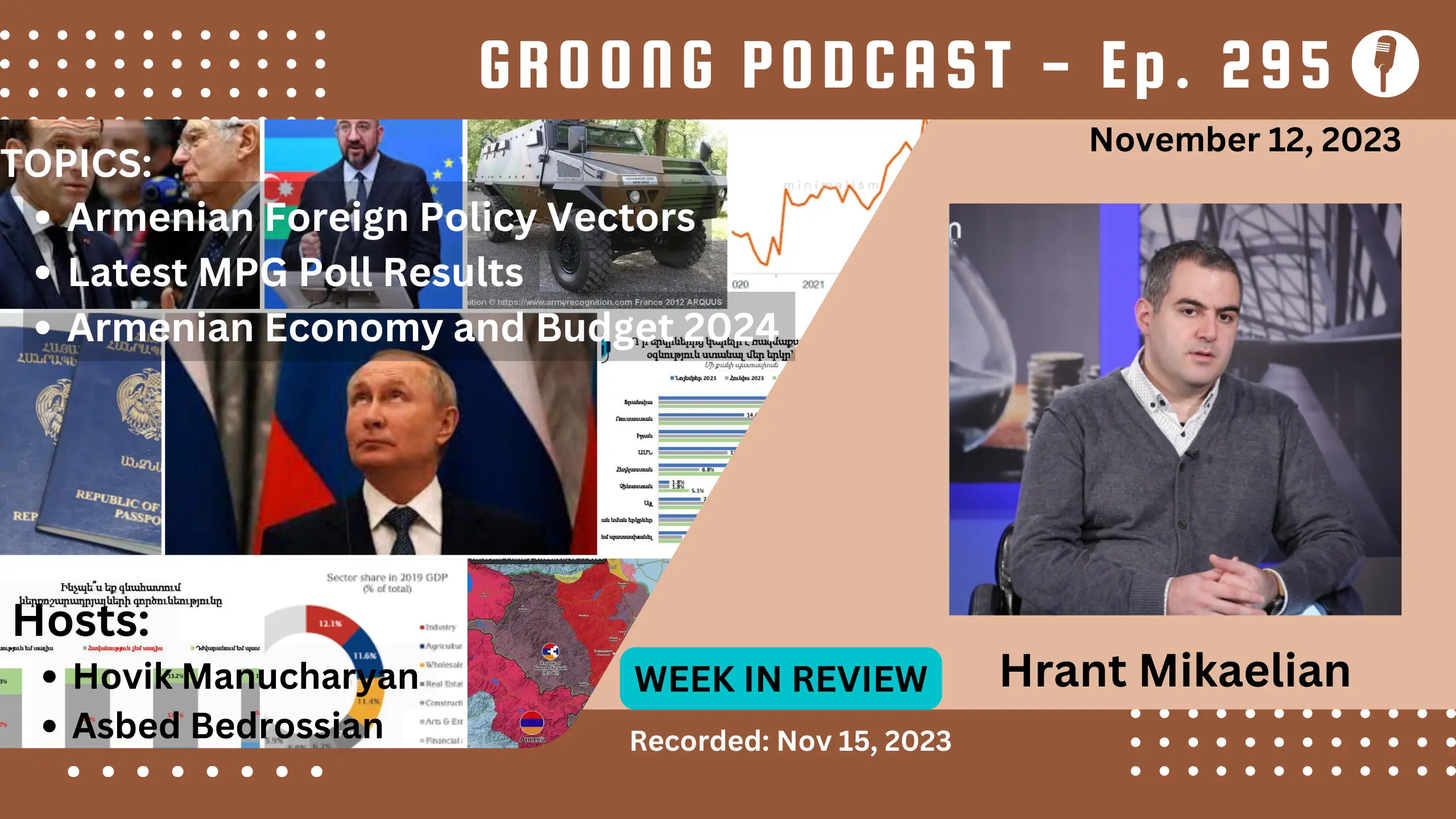
Groong Links:
Guest:
Topics:
- Armenian Foreign Policy Vectors
- Latest MPG Poll Result Analysis
- Armenian Economy and 2024 Budget
Episode 295 | Recorded: Nov 15, 2023
Show Notes
Pashinyan’s Vector Roulette
“What’s our vector, Victor?”
The Western Vector
First, let’s begin with Armenia-West relations.
Armenia’s Foreign Policy seems like it’s all about attending conferences in the west and hosting European MP’s to tell them about Pashinyan’s Crossroads of Peace. and avoiding important ministerial and summit meetings on the Russian side. Armenian authorities made serious efforts to find any conference in the West that they could attend, so that they’d have an excuse not to attend a CSTO event.
- Pashinyan attends “Paris Peace Forum”
- The only foreign head of state that attended
- Armen Grigoryan attends a conference called “The Strategic Future of Armenia” in Brussels
- Repeats once again that Armenia is ready to come to Brussels to sign peace treaty with Azerbaijan
- Let’s not forget Armen Grigorian in Malta for a Zelensky conference to discuss his plan for the war against Russia. (a couple of weeks ago.
- Etc.
Following Azerbaijan’s abrupt and dismissive boycott of western mediation in Granada then Brussels, the EU has amped up its language against Azerbaijan. Joseph Borell said that in the case of violation of territorial integrity of Armenia, the EU will review its relationship with Azerbaijan. A little stronger language than guaranteeing ahead of time that they won’t do anything. Germany’s foreign minister Baerbock visited Armenia, and in the past few days the council of foreign ministers of the EU showed strong support for Armenia. The EU announced:
- Increase of monitoring mission (EUMA)
- More opportunities for military aid funding
- And most important for Armenians: focus on discussions on visa liberalization
At the same time, the foreign ministers of the G7 also expressed “grave concern” and support for Armenia’s territorial integrity.
There was also news that some French weapons shipments are already arriving in Georgia, destined to Armenia. Primarily we read this in Azerbaijani media.
If it wasn’t for the fact that just a few months ago, over 100,000 Armenians from Artsakh were ethnically cleansed, while not a single package of sanctions was applied to Azerbaijan, the news that the EU might help Armenia’s security would be almost believable.
Questions:
- The EU Monitoring mission was here for half a year now. Maybe they weren’t stationed in Stepanakert but surely they did see 100’s of thousands of people cross the Lachin checkpoint. Did they even acknowledge that what happened was ethnic cleansing? What will increasing the size of this monitoring force do?
- How serious is the EU’s commitment to Armenia? In the past EU officials have explicitly stated that they can’t physically protect Armenia. To the best of our knowledge, is there any change in that stance?
- How serious is the French supply of weapons to Armenia as a replacement for Russian weapons supplies? How serious is France’s desire to act as a strategic partner for Armenia, and replacing Russia?
The Russian Vector
Meanwhile, the Russian vector in Armenian politics remains just as strained as ever. This week Pashinyan informed Lukashenko that he would not be attending the CSTO summit. Lukashenko called on Pashinyan to not take rash steps.
Russia has been removing military equipment from Artsakh with the pretext of rotating equipment through repair, and so on. There is a lot of talk about Russian peacekeeping forces downgrading their presence permanently.
Question:
- Is Russia closing a chapter on Artsakh? Do they consider the conflict finished and done?
Russia is still talking about controlling a corridor through Armenia. At this point it seems like it’s their last hope to keep a presence in the South Caucasus, so they’re uniquely focused on Point 9 of the November 2020 ceasefire agreement.
Questions:
- While nobody has rescinded their signature from the agreement, is that document valid still? There is no Lachin corridor, Armenian POWs have not been returned, there are no Armenians in Artsakh, the Nov. 9, 2020 line of contact has been completely disregarded and Azerbaijan has invaded Armenian territory. So points 1 through 8 of the agreement have been completely breached, trashed. What talk can there be of point 9?
- Is Pashinyan’s Crossroads of Peace, the so-called “Խաղաղության խաչմերուկ”, basically his plan to socialize Point 9 domestically?
Latest MPG Poll Results
We should note that these poll results may seem very paradoxal at first glance.
Whether you disagree with the sentiments expressed in this poll, it is important to try to analyze and understand these results and take informed action based on this data.
Armenians “Rosy” Present and Future
Multiple questions in this poll were asked about Armenians’ opinions about the quality of their life today and their hope for the future.
While it can’t be compared with the euphoric atmosphere of 2019, when more than 50% of respondents were satisfied with their lives, this metric of satisfaction with the present hasn’t taken any significant drop from April 2023 results. Similarly, the number of people who think they’ll be better off in the future has risen from 41.7% in 2021 to 49.1% currently.
Questions:
- The margin of error for this poll is +/-3.5%, but even accounting for that, the current situation is not having any effect on the optimism of Armenians. So first question… How much trust can we place in the objectivity of this pollster?
- Are Armenians living in a virtual fantasy world? How is it possible to keep them so optimistic?
- How big of an effect are government-controlled media having on the sentiment of the public?
Pashinyan’s Approval Rating
On the question of “How much do you trust Nikol Pashinyan”:
- 20.4% - very much
- 13.2% - somewhat
- 18.6% - somewhat no
- 35.5% - completely distrust
- 12.3% - difficult to answer
Pashinyan’s “anti-rating” still seems to be high: 35.5 + 18.6 = **54.1%. **But Pashinyan’s favorable rating has gone up apparently to 20.4 + 13.2 = 33.6%
In May 2023, these numbers were:
- Favorable: 5.4% + 13.4% = 18.8%
- Unfavorable: 24.2% + 47.1% = 71.3%
Question:
- 54.1% disapproval is still very high, but Pashinyan’s rating seems to be on an upward trajectory. What factors would you attribute this to?
Most Say We Should Struggle For Artsakh
Despite Armenians’ apparent satisfaction with their lives and relative rosy outlook for the future, when asked about Artsakh, the respondents time and time again give answers that make more sense.
Given the aftermath of the genocide in Artsakh:
- 46.6% say that Armenia should struggle for the independence of Artsakh, securing the return of Artsakh Armenians to their homeland
- 40% said that Armenia should integrate Artsakh Armenians in Armenia and ensure their social and other rights are protected
Questions:
- Your thoughts on this question?
- Is Armenia doing enough to secure the rights of Artsakhtsis who wish to be integrated into life in Armenia?
Political Prisoners
More than half of the respondents said that they believe Armenia has political prisoners.
Specifically:
- Yes: 52%
- No: 23%
- Difficult to answer: 25%
Question:
- Can this belief that you can go to jail for your beliefs affect how people respond in polls?
- Why doesn’t this concern about fundamental freedoms affect the optimism of the people?
Full Results
Methodology
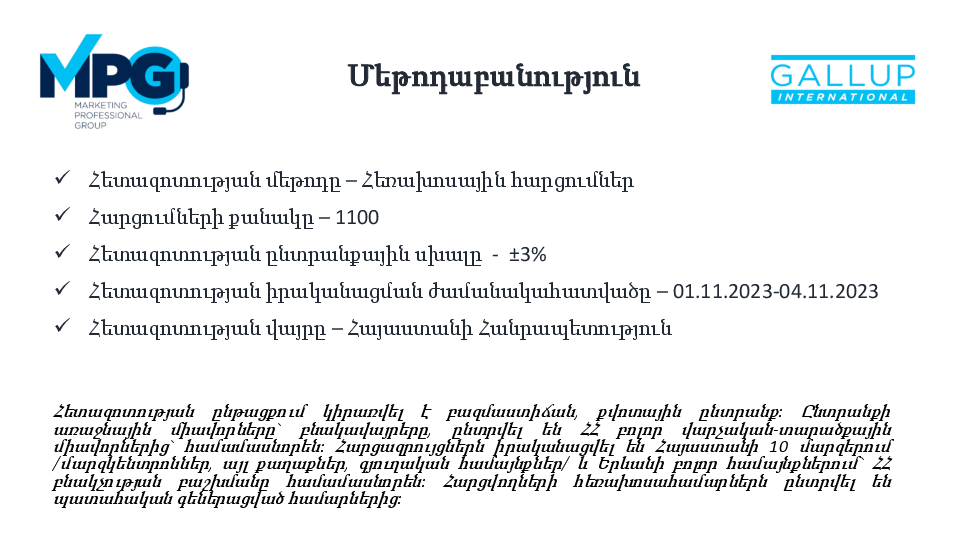
In General Are You Satisfied With Your Life?
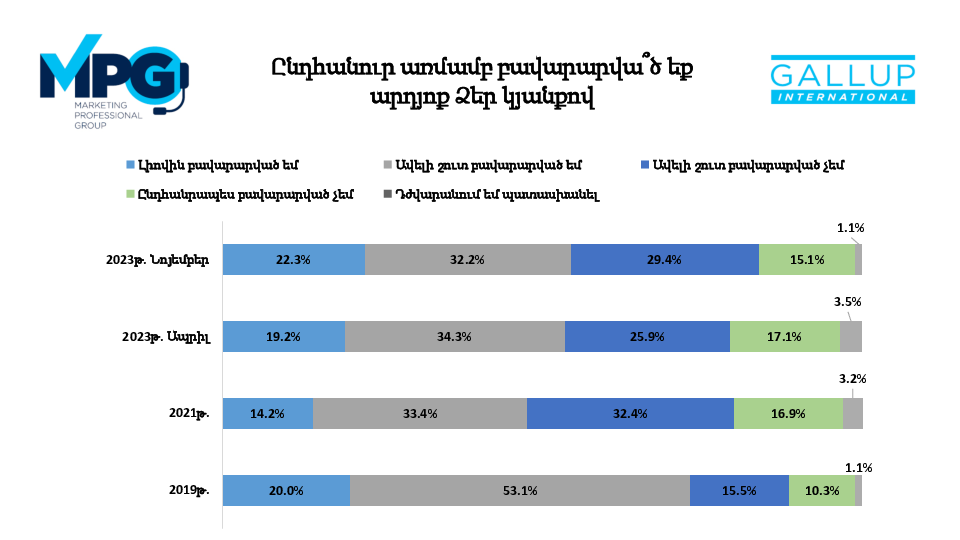
How Would You Evaluate Your Family’s Current Material/Economic Security
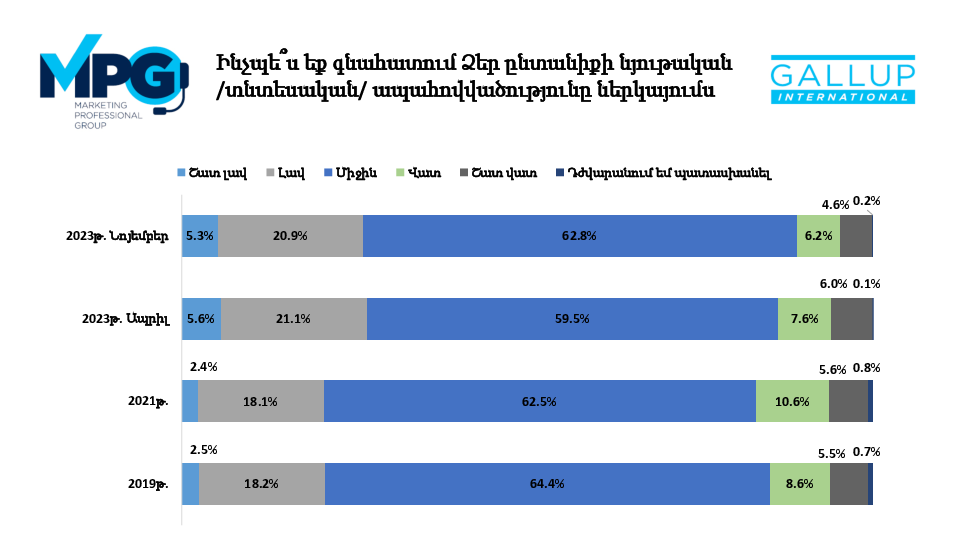
In your opinion, will you/your family live better off or worse after one year?
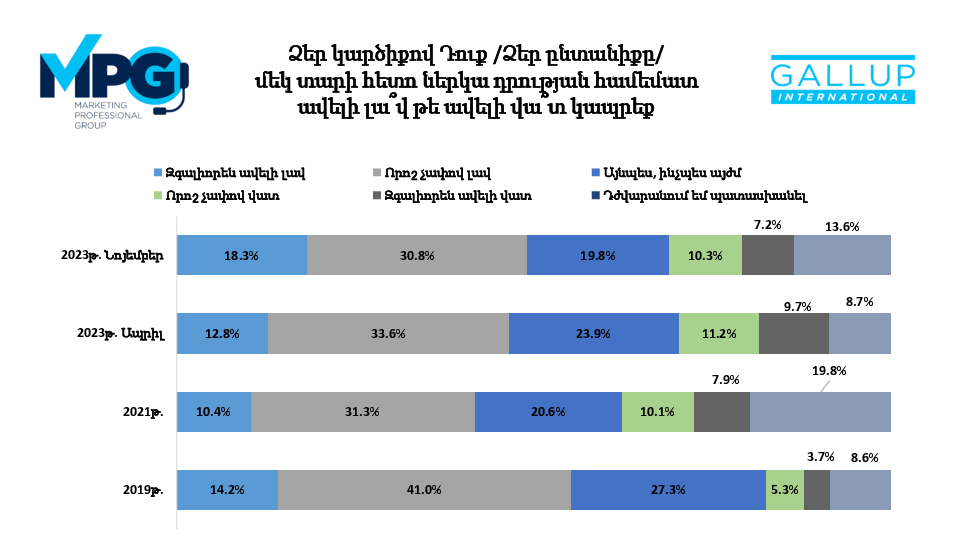
How do you rate the activities of the following institutions?
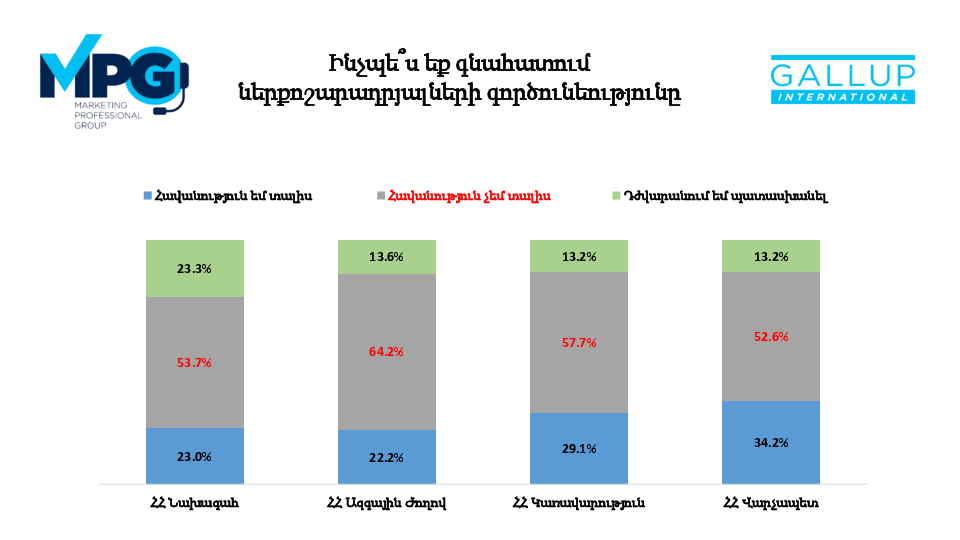
Towards which country or countries do you think Armenia’s integration vector should be directed?
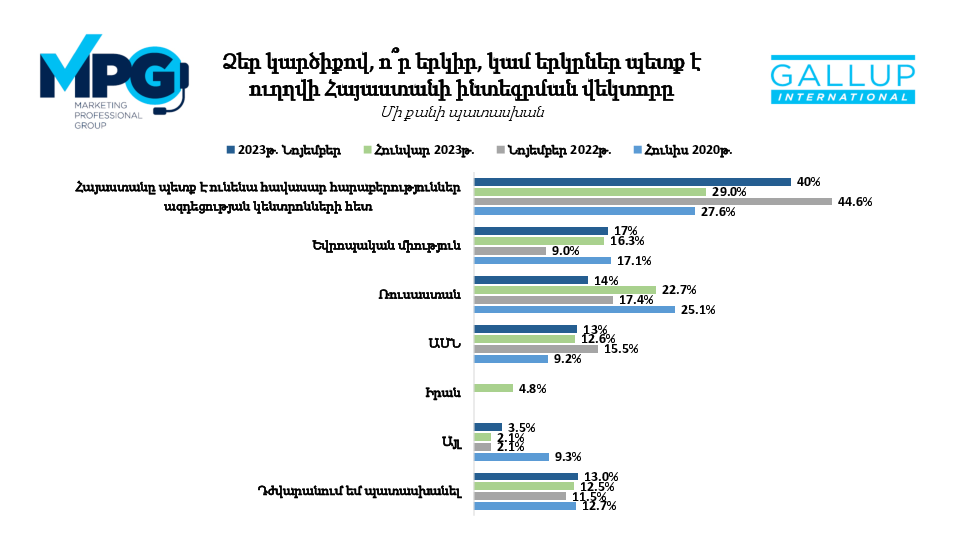
From which countries can our country obtain military and political help?
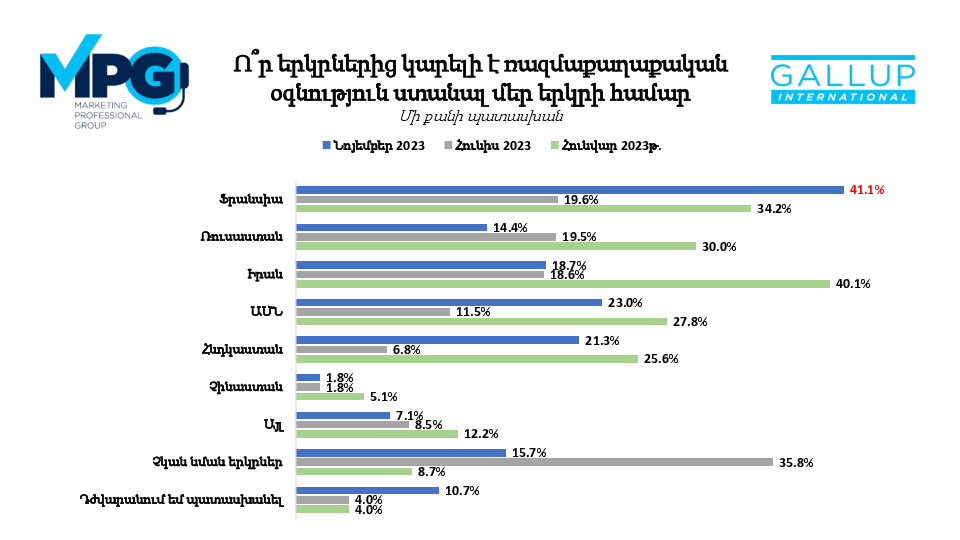
According To You Does Armenia Currently Have Political Prisoners? If so, name one.
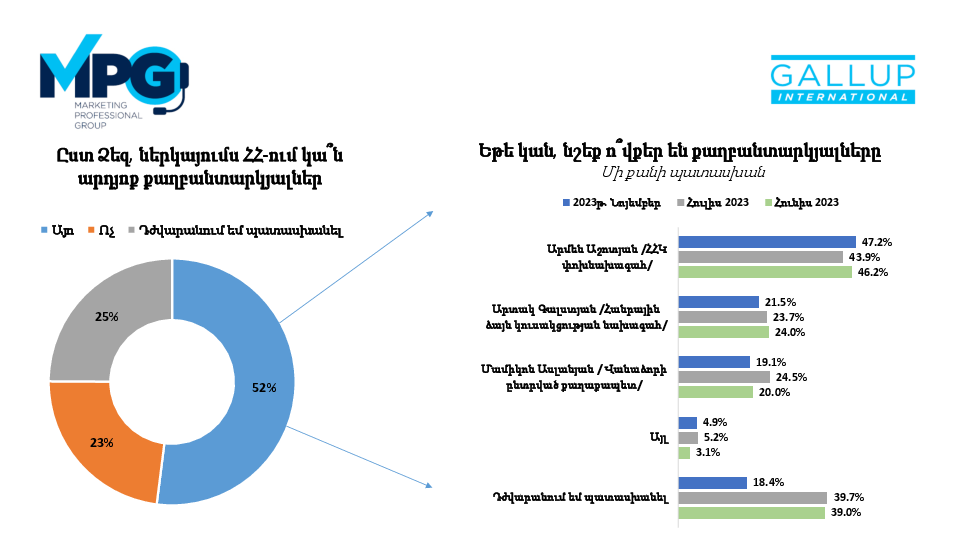
Due to the armed attack of Azerbaijan on September 19, Artsakh was completely depopulated and more than 100,000 people were forcibly displaced and migrated to Armenia. How do you think the Republic of Armenia should behave?
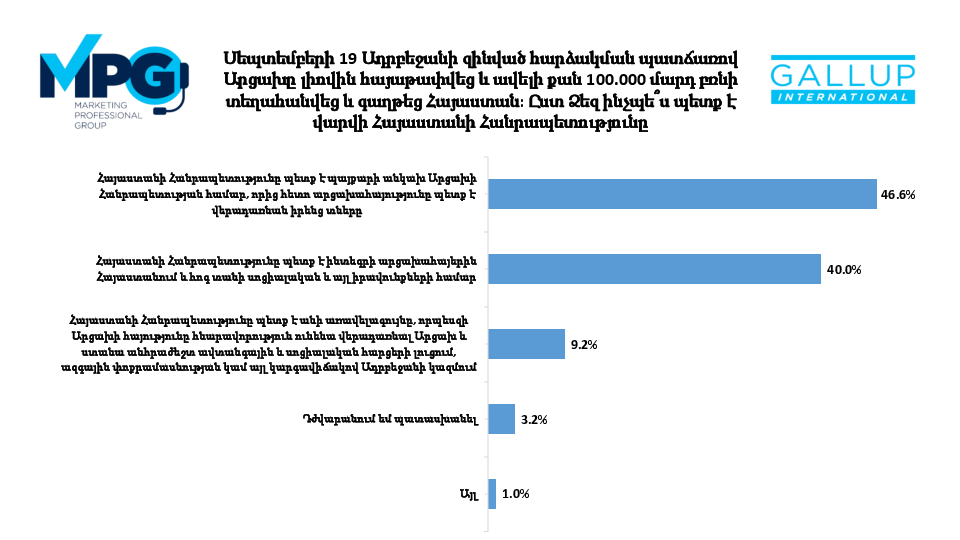
How much do you trust RA Prime Minister Nikol Pashinyan?
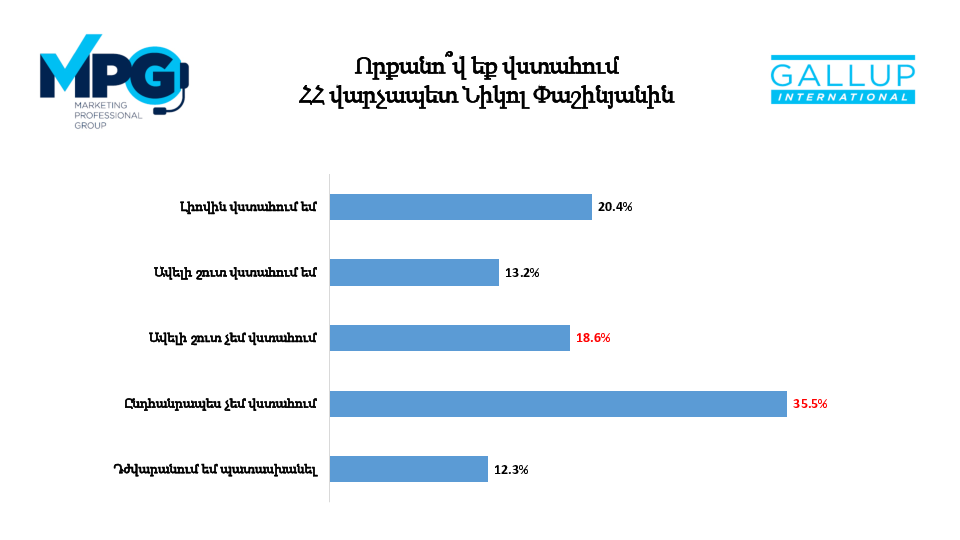
According to you, in order to solve the internal political situation, is it necessary to hold extraordinary parliamentary elections in RA?
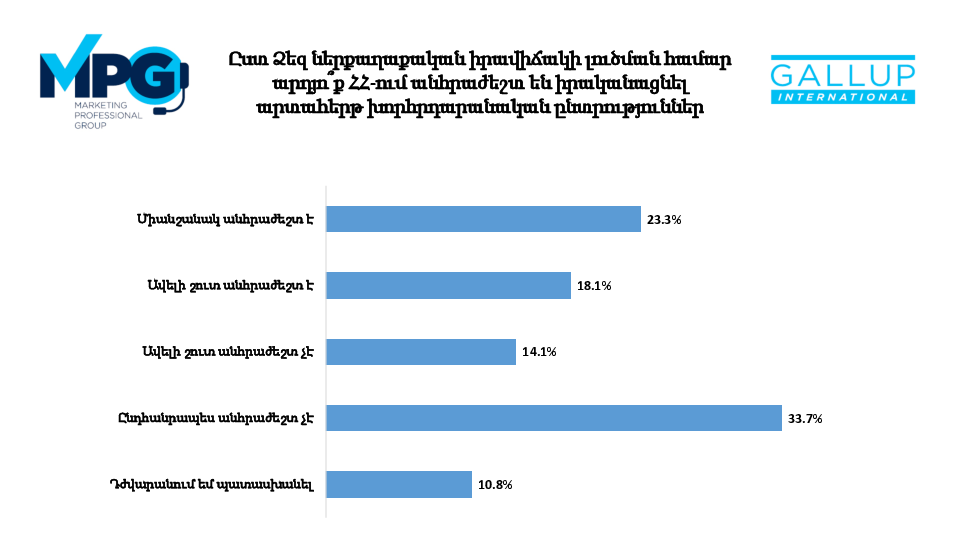
If there were Parliamentary elections next Sunday, which party or bloc would you vote for?
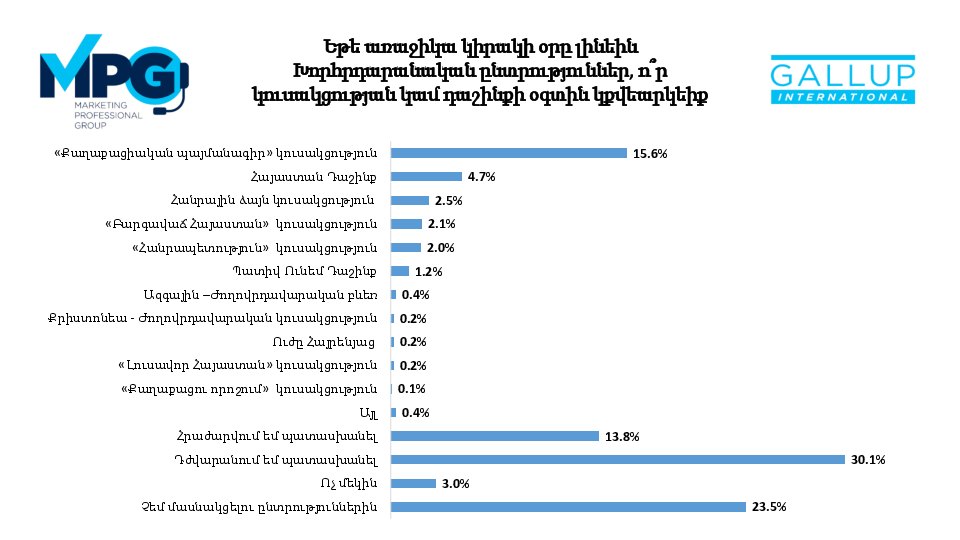
Armenian Budget and Economy
In the past month, the parliament passed a national budget for 2024. Key aspects:
- 2,566 billion drams in tax revenues
- 2,321 billion in expenditures
- 700 billion in capital expenditures
- 3.2 billion budget deficit in 2024
- The national debt will stand at 5318 billion drams ($13.3B) = 50.7% GDP
- 755 billion will go to the social sector
- 555 billion is earmarked for defense, with a 41% increase in the capital expenditures going to defense
- 120 billion is capital expenditure earmarked for roads & infrastructure.
- Around 54 billion is earmarked to support Artsakh refugees. Notably, there is no support for Artsakh as a state. That is not part of the values reflected in this budget
Finally, while the economy is hyped to expand somewhere between %5.5 and 7%, the Armenian industrial and mining outputs are shrinking. Only re-exporters are reportedly doing great, which means that the deep reliance on Russia, and especially the war in Ukraine, remains solidly in place in Armenia.
Questions:
- On the surface, the budget numbers look interesting, but the economic information doesn’t seem to support it. Can you help us make sense of it? Is this a good, or realistic budget?
- What is your outlook for the Armenian economy in 2024, and why?
The reliance on Russia is also a cause for concern, particularly because it seems like Pashinyan is biting the hand that’s feeding his economy. If Russia were to respond economically, for example, tweak the remittances to Armenia; or disrupt the gas supply; or block the re-export vector; or whatever, it would absolutely cripple the Armenian economy and everyday life. Even the latte-snorting expats in central Yerevan might start feeling a pinch!
Questions:
- There are some indications that the real-estate market is cooling, as some Russian, Ukrainian migrants who came after the war in Ukraine started, may be leaving. What are your thoughts about this sector of the economy?
- Given how heavily the Armenian economy has benefited and expanded and relies on the war in Ukraine, it’s not out of place to ask: What is your view on the state of that conflict? Is there an end in sight? How should Armenia navigate it?
Topics from the Panelists
- Hovik: Does awareness that there are political prisoners in Armenia, who are in jail simply for their opinions and speech, affect the non-response bias of the polls?
- A word about Armenia’s political prisoners and judicial harassment.
- Hrant: Political Prisoners and their rising numbers in Armenia.
Wrap-up
We hope you found our Week in Review helpful. We invite your feedback and your suggestions, you can find us on most social media and podcast platforms. Thanks to Laura Osborn for the music on our podcasts.
Guests
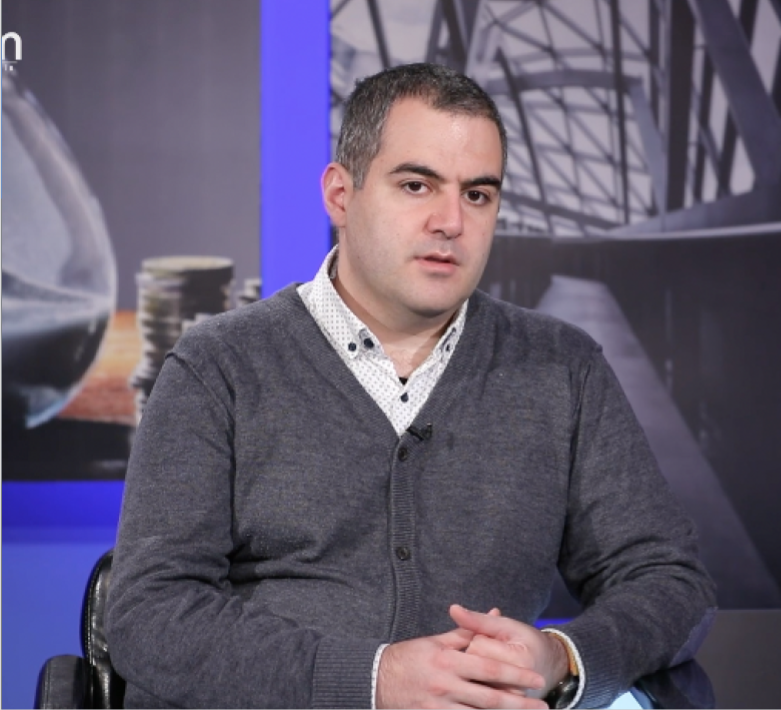
Hrant Mikaelian
Hrant Mikaelian, a political scientist and multidisciplinary researcher in social sciences based in Yerevan. He is also a senior researcher at the Caucasus Institute. Hrant is a co-founder of the Armenian Project.
Hosts

Hovik Manucharyan
Hovik Manucharyan is an information security engineer who moved from Seattle to Armenia in 2022. He co-founded the ANN/Groong podcast in 2020 and has been a contributor to Groong News since the late 1990s.
Disclaimer: The views expressed by Hovik Manucharyan on the ANN/Groong podcast are his own and do not necessarily reflect the opinions of his employer or any other organization.

Asbed Bedrossian
Asbed Bedrossian is an IT professional, and for years oversaw the central IT enterprise infrastructure and services at USC. His decades of experience spanned across IT strategy, enterprise architecture, infrastructure, cybersecurity, enterprise applications, data center operations, high performance computing, ITSM, ITPM, and more.
Asbed founded the Armenian News Network Groong circa 1989/1990, and co-founded the ANN/Groong podcast in 2020.